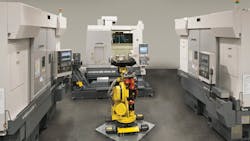CNC machine builder OKUMA AMERICA CORP. launched a new “all Okuma” work cell customized to the production demands of aluminum wheel manufacturing. The cells are specifically designed to allow wheel manufacturers to increase productivity and efficiency while minimizing downtime.
The core of the arrangement is its MB-56VA-AW aluminum wheel-drilling machine, a new design that emphasizes reliability in lathing operations, as well as two more Okuma CNC lathes in a selection of sizes. All three Okuma machines feature the THINC®-OSP open architecture CNC control, for easy integration, greater functionality, and accessibility to third-party applications.
Okuma America — sales and service affiliate of CNC machine tool builder, Okuma Corporation— explained that the MB-56VA-AW aluminum wheel-drilling machine extends the reliability of its lathes to a machining center/drill. It’s a design based on a vertical machining center, and incorporates the latest available technology, tailoring specifications to the high-speed requirements of aluminum wheel drilling and milling.
The integrated high-speed trunnion table supplies full four-axis machining capabilities.
Okuma offers five models of CNC lathes to support the drilling process, meaning operators can customize their cell configurations with sizes ranging from 16 to 24 in., featuring quick-changeover workholding providing flexible top tooling for the chuck, reducing the need for changeovers between setups.
Because all three machines are Okuma designs, all three feature the THINC-OSP control — which supports fuller integration with the most up-to-date engineering simulation tools, and throughout operations. Real-time monitoring and alarm notifications can now be enabled, Okuma indicated, and cell monitoring and performance reporting functions are more robust. Adding third-party applications is possible too as a consequence of this open architecture CNC control.
Supporting wheel production is a Fanuc robot, with well-established gripper design and vision technology that makes possible fixtureless locating and orientation, eliminating manned verification and offset probing.
Gosiger Automation, a system integrator, handles installation and service for the wheel cell, deploying advanced engineering and simulation, Controllogix programming, and wheel process monitoring to ensure reliable cell performance.
Visit www.okuma.com
